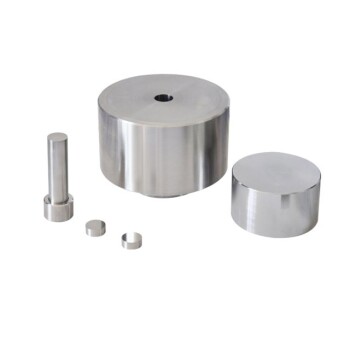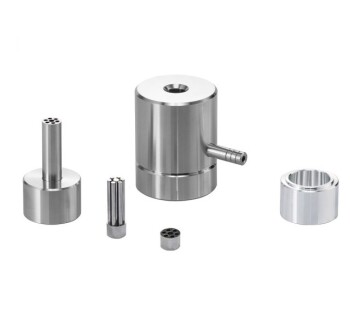At its core, a laboratory hot pressing machine is a specialized piece of equipment designed to simultaneously apply precise heat and pressure to a material sample. It is used to consolidate powders, form polymer sheets, or create dense, void-free material specimens within a controlled environment. This tool is indispensable for users who have strict requirements for material density, uniformity, and microstructural properties.
The decision to use a laboratory hot press is driven by the need to control a material's final properties with high precision. While simple ovens heat and standard presses compact, only a hot press combines these forces simultaneously, enabling the creation of advanced, highly-engineered materials that are otherwise impossible to produce.

The Core Function: How a Hot Press Works
A laboratory hot press operates on a simple but powerful principle: applying heat softens a material, making it more pliable, while hydraulic or mechanical pressure forces the material particles together, eliminating porosity and forming a solid, dense object.
The Principle of Sintering and Consolidation
Heat provides the thermal energy needed to initiate bonding between material particles, a process known as sintering. Simultaneously, the applied pressure mechanically forces these particles into close contact, which dramatically accelerates the consolidation process and helps create a uniform microstructure.
Precise Temperature Control
These machines feature heated platens with highly accurate temperature controllers. This allows a user to program specific heating rates, hold times, and cooling profiles. This level of control is critical for materials like polymers, which have narrow processing windows, or for advanced ceramics where the thermal cycle dictates the final grain structure.
Uniform Pressure Application
The press ensures that force is applied evenly across the entire surface of the sample. This uniform pressure is key to preventing defects like warping or cracking and ensures that the final sample has consistent density and mechanical properties from edge to edge.
The Role of Molds
Most hot pressing operations utilize molds to define the sample's final shape and dimensions. The ability to use a wide range of mold sizes and shapes makes the hot press a versatile tool for creating everything from thin films and small pellets to larger test plaques or custom components.
Who Needs a Laboratory Hot Press?
The need for a hot press is directly tied to the need for materials with highly controlled, engineered properties. It is not a general-purpose tool but a specialist instrument for specific fields.
Materials Science Researchers
For scientists developing new alloys, ceramics, or composite materials, the hot press is fundamental. It allows them to create dense samples for analysis and to study how different processing parameters affect the material's final characteristics.
Polymer and Plastics Engineers
In polymer science, hot pressing is used to mold test specimens for mechanical testing (like tensile or impact strength), create multi-layered films, and study the behavior of polymer blends under heat and pressure.
Quality Control Laboratories
Industries from aerospace to medical devices rely on hot presses for quality control. The machine prepares highly consistent samples from production batches, which are then tested to ensure the material meets strict performance and safety specifications.
Critical Considerations and Safety Protocols
Operating a hot press involves managing significant energy in the form of heat and pressure. Its effective use is predicated on understanding its limitations and adhering to strict safety measures.
The Need for Trained Personnel
This is not a "plug-and-play" device. Only trained personnel who understand the principles of operation and the specific material they are working with should operate a hot press. Misuse can lead to damaged equipment and failed samples.
High-Temperature and High-Pressure Hazards
Operators must always wear appropriate personal protective equipment (PPE), including heat-resistant gloves, and keep all body parts clear of the pressing area. Never exceed the machine's specified maximum temperature and pressure limits.
Electrical and Environmental Risks
Ensure the equipment is properly grounded and that the surrounding area is dry to prevent electrical shock. If the process may release harmful gases, the machine must be used in a well-ventilated area or under a fume hood.
The Importance of Supervision and Maintenance
A hot press should never be left unattended during operation. Know the location of the emergency stop button. Regular inspection and maintenance are mandatory to ensure the safety systems and control units are functioning correctly.
Is a Hot Press the Right Tool for Your Goal?
Choosing the right equipment depends entirely on your end goal. A hot press is a powerful tool, but it is not always the necessary one.
- If your primary focus is developing novel materials with specific densities: A hot press is essential for controlling microstructure and achieving the consolidation required for advanced applications.
- If your primary focus is routine quality control testing: A hot press ensures your test samples are prepared with high consistency, leading to reliable and repeatable mechanical test results.
- If your primary focus is simply shaping a material without precise density control: A standard (unheated) hydraulic press and a separate oven may be a more cost-effective and simpler solution.
Ultimately, a laboratory hot press is the bridge between raw materials and high-performance engineered components, giving you direct control over material creation.
Summary Table:
| Aspect | Details |
|---|---|
| Core Function | Applies precise heat and pressure simultaneously to consolidate materials, eliminate porosity, and create dense specimens. |
| Key Features | Precise temperature control, uniform pressure application, compatibility with various molds for shaping. |
| Primary Users | Materials science researchers, polymer engineers, quality control labs in aerospace, medical devices, etc. |
| Main Applications | Powder consolidation, polymer sheet formation, creation of test specimens for mechanical analysis. |
| Safety Notes | Requires trained operators, use of PPE, proper grounding, and supervision to manage high-temperature and high-pressure risks. |
Unlock Precision in Your Lab with KINTEK's Advanced Hot Press Machines
Are you a materials scientist, polymer engineer, or part of a quality control team striving for superior material density and uniformity? KINTEK specializes in high-performance lab press machines, including automatic lab presses, isostatic presses, and heated lab presses tailored for your specific needs. Our equipment ensures precise temperature and pressure control, enabling you to create dense, void-free samples for reliable testing and innovation. Don't let inconsistent results hold you back—enhance your research and quality assurance processes today. Contact us now to discuss how our solutions can elevate your laboratory's capabilities and drive your projects forward!
Visual Guide

Related Products
- Heated Hydraulic Press Machine with Heated Plates for Vacuum Box Laboratory Hot Press
- Automatic High Temperature Heated Hydraulic Press Machine with Heated Plates for Lab
- Lab Heat Press Special Mold
- Laboratory Manual Heated Hydraulic Press Machine with Hot Plates
- Automatic Heated Hydraulic Press Machine with Hot Plates for Laboratory
People Also Ask
- What role does a heated hydraulic press play in powder compaction? Achieve Precise Material Control for Labs
- What industrial applications does a heated hydraulic press have beyond laboratories? Powering Manufacturing from Aerospace to Consumer Goods
- Why is it necessary to use heating equipment for the dewatering of hempseed oil biodiesel? Expert Quality Guide
- How is the temperature of the hot plate controlled in a hydraulic lab press? Achieve Thermal Precision (20°C-200°C)
- What is a hydraulic hot press machine and how does it differ from a standard hydraulic press? Unlock Advanced Material Processing



















